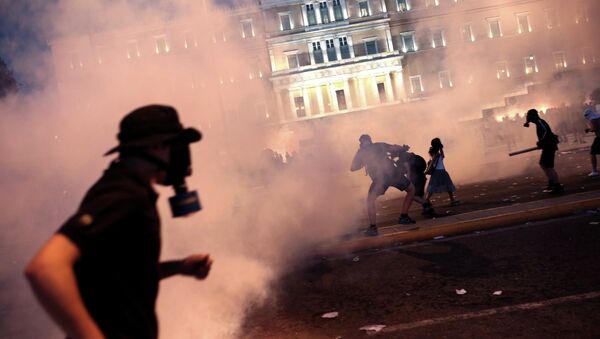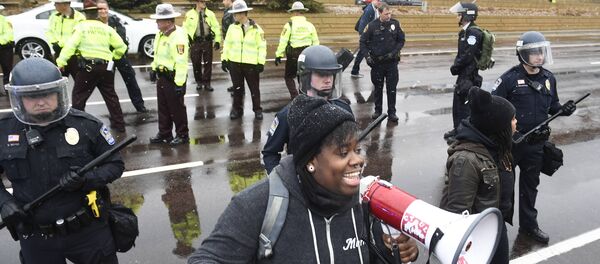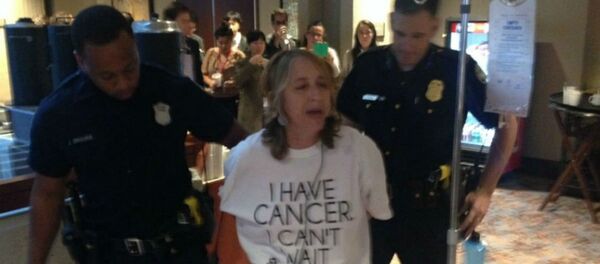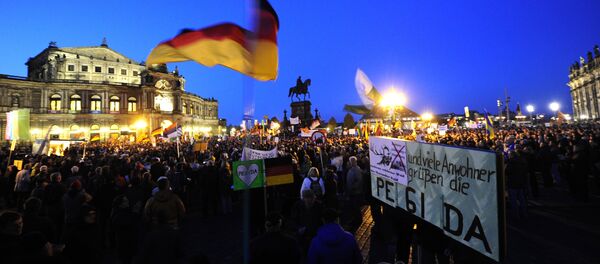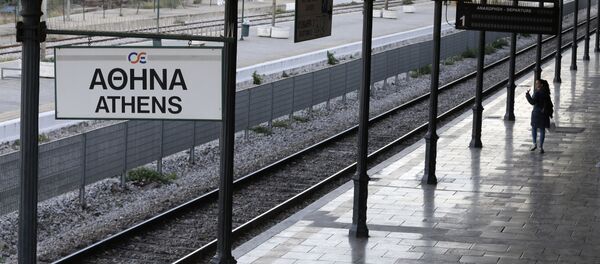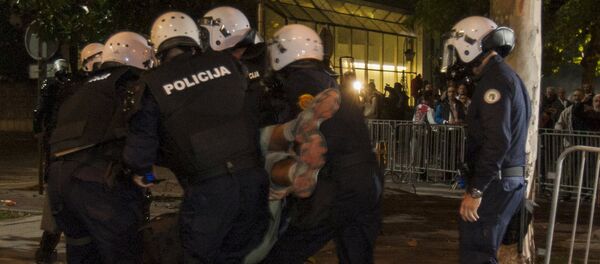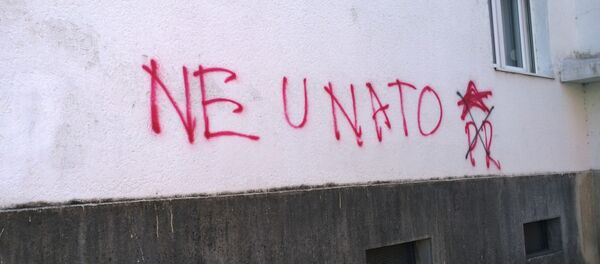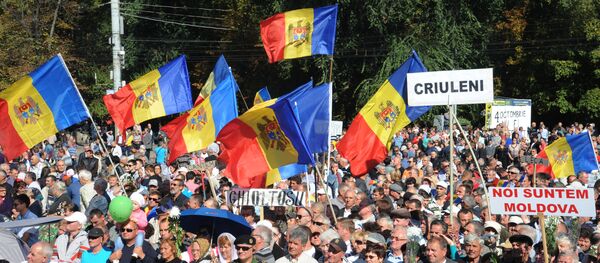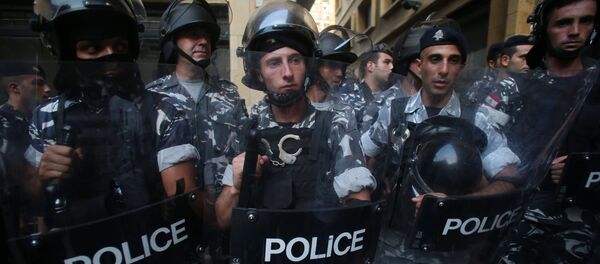MOSCOW (Sputnik) — The outgoing year has been a big one for protests that ranged from demonstrations against governments in Europe and rallies against police brutality in the United States to huge protests against mega-agreements on trade globally.
Black Lives Matter Rallies in US
The year 2015 saw continued protests against police brutality, specifically by white lawmen against black people in several US states.
Hundreds of protesters took to the streets of Chicago, Illinois, on Christmas Eve to call for the resignation of Mayor Rahm Emanuel. A crowd of predominantly black demonstrators chanted "Sixteen shots!" in reference to the killing of Laquan McDonald, a black teenager shot dead in October 2014 by white police officer Jason Van Dyke.
The protest action, dubbed Black Christmas, was organized by Black Lives Matter, a loosely-connected movement that emerged as a hashtag in 2012 and grew out of outrage over the police shooting of Trayvon Martin in Florida to a full-blown movement against extrajudicial killings of black people by police and vigilantes.
In August, thousands of demonstrators took to the streets of Ferguson, Missouri to mark the one-year anniversary of Michael Brown’s death. The unarmed teenager was fatally shot by police officer Darren Wilson a year earlier. Two investigations concluded that the officer had acted in defense.
In November, Black Lives Matter protesters camped outside a police precinct in Minneapolis for days after police fatally shot 24-year-old Jamar Clark. Police said he had tried to disarm an officer, while activists claimed the young black man was handcuffed and not resisting.
More protests against police brutality toward black citizens took place in Brazil’s Rio de Janeiro in November. Hundreds of Brazilians amassed in the inner city to demonstrate against "genocide" following the shooting of five young people by local lawmen in a poor neighborhood.
A protest against police violence, to mark the international day of action, was broken up in Canada’s Montreal in March over alleged concerns about security.
Rallies Against Multilateral Trade Deals Go Global
A batch of US-promoted trade mega-agreements – TPP, TTIP, and TISA – brought people to the streets in Europe and other member countries throughout the year, with the most notable protest in Berlin drawing hundreds of thousands in October.
It is feared the US-EU deal, which has been discussed for years behind closed doors, will give too much power to corporations and water down standards for global trade. Proponents argue that the accord will create the world’s largest free trade zone and harmonize trade relations across the Atlantic.
Protests followed the announcement that an agreement had been reached by negotiators of the parallel TPP talks on the Trans-Pacific Partnership earlier that month to streamline the flow of goods and services between 12 countries, including the United States, Canada, Japan, Australia and New Zealand.
In New Zealand, thousands of people took to the streets in Auckland and dozens of towns in November to call on the government to back out of the deal, which they said would hurt the economy of the small island nation and open it up to corporate greed.
A bigger protest in August amassed an estimated 5,000 in Auckland alone, with smaller turnouts reported in Nelson, Christchurch, Hamilton, and Dunedin.
Anti-Migrant Pegida Splits Germany
On October 19, Germany’s anti-immigration Pegida group marked its first anniversary with a thousands-strong gathering in the heart of Dresden, which attracted similar numbers of rival protesters.
Pegida – which stands for Patriotic Europeans Against the Islamization of the West – started in fall 2014 as a small campaign calling for more immigration restrictions.
The movement started losing momentum following a major scandal involving its leader Lutz Bachmann, whose selfies sporting a Hitler moustache brought him under fire amid accusations of xenophobia and forced him to resign. Bachmann later said the photo had been manipulated.
The migrant crisis in Europe gave Pegida a fresh lift in the fall of 2015 as it became clear that the number of refugees coming to the European Union’s powerhouse nation would exceed the 800,000 mark predicted by the government.
As all states in Germany were gripped by the pressing question of where to house refugees, who were arriving every day in their thousands, several designated asylum shelters across the country sustained arson attacks.
Most notably, Dresden Nazifrei (Dresden Without Nazis) sprung up in the months after Pegida’s creation to mount counter-protests. Following Pegida’s comeback, the anti-Nazi group called for a large-scale conference in mid-January, 2016 where it will hammer out a strategy to counter Pegida as a "specific Saxonian phenomenon."
Greeks Take to Streets to Protest Austerity
Economic concerns dominated public protests in Greece where thousands rallied in central Athens in the summer to back the ruling Syriza party in its efforts to roll back the austerity measures imposed on the country under its EU bailout plan.
Despite the opposition, the government caved in to the creditors’ demands and accepted the austerity measures in July, prompting new protests.
In November, thousands of Greek workers from both public and private sectors took to the streets of major cities to protest the leftist government’s dramatic policy shift.
A second walkout in early December disrupted public services, grounded domestic flights and halted rail, shipping and ferry operations across the country. Thousands protested against pension reforms and other austerity measures in the 2016 draft budget that was passed by parliament after a five-day marathon debate.
Anti-NATO Rallies in Europe
NATO’s military presence and massive military drills across Europe in the outgoing year have led to vocal rallies in the bloc’s member states.
In Spain, anti-NATO activists marched from Madrid to an air base at Torrejon to protest NATO’s military presence, with more protests staged in the northeastern city of Zaragoza.
In Portugal, Green Party activists held peaceful rallies in three cities, while around a thousand protesters amassed on the Italian island of Sicily, NATO’s Mediterranean hub, for several days to protest the growing financial burden NATO membership entails.
Bigger protests erupted in Montenegro in the Balkans in September after it emerged that the US-led NATO military bloc was to extend an official invitation to the small mountainous nation with a tiny armed force of less than 2,000.
Thousands of Montenegrin citizens took to the streets in the months leading up to and immediately after the invitation was issued on December 2 to the former Yugoslav republic, where hundreds of civilians died in the 1999 NATO bombings.
In October, anti-government demonstrators camped out in Montenegro’s capital Podgorica and called for Prime Minister Milo Djukanovic’s resignation.
A large protest in Podgorica on October 24 was broken up by riot police using tear gas, with dozens subsequently seeking medical help. Djukanovic accused opposition parties and Russia of stoking the unrest. Moscow denied the allegations but reiterated its position that the decision to enter NATO should be put to nationwide vote.
In mid-December, some 5,000 people gathered again in Podgorica in a last-ditch attempt to steer the country away from the course toward NATO accession, which will be finalized once all 28 NATO member states have approved it.
Anti-Corruption Protests in Moldova
A wave of anti-government protests hit the Eastern European nation of Moldova in the spring of 2015 amid a worsening economic crisis and corruption allegations.
The main demand of protesters, led by the civic platform Truth and Dignity (DA), was the government’s resignation following the disappearance of $1 billion from three national banks in 2014. In response, international and EU money lenders froze assistance to the country.
People first took to the streets in April and soon split into two camps – a pro-EU movement led by the right-wing DA Platform calling for unification with Romania, an EU member, and a left-wing group with the Party of Socialists and the leftist Our Party at its helm.
The protest peaked at almost 100,000 in September when a huge crowd gathered in central Chisinau, shouting "Shame!" and "Thieves!" Scuffles broke out at an off-shoot rally when several protesters broke through a police cordon outside the prosecutor’s office.
Demonstrators drew up a list of demands that included, among the repeated calls for the government’s and parliament’s resignations, a change in the constitutional system so that the president is chosen by direct ballot, rather than by lawmakers.
Stansislav Pavlovskiy, a leader of the DA Platform described the demands as a "howl of pain" from Europe’s poorest nation.
In October, Moldova’s former Prime Minister Vlad Filat was detained in connection with the theft of money from Moldovan banks. He was handcuffed in parliament by masked police forces. Hundreds of people crowded outside the building to stop Filat from escaping. He has denied the charges.
Later that month, Parliament passed a motion of no confidence in the centrist coalition government headed by Prime Minister Valeriu Strelet of the Liberal Democratic Party. It was supported by a range of parliamentary factions, including the Socialist, Communist and Democratic parties.
Trash Crisis Rallies in Lebanon
The closure of a major dump outside the Lebanese capital of Beirut in July caused mounds of trash to pile up on the roadsides across the city. It raised serious health concerns and reignited debate about the paralyzed government’s ability to develop the country’s infrastructure.
Lebanon has been in a political vacuum since then-President Michel Suleiman stepped down in 2014, and parliament could not agree on his replacement. The parliament, elected seven years ago, extended its term and postponed elections until 2017, citing instability. The move prompted outrage from the public.
The date for the closure of the Naameh landfill, just south of Beirut, was set for July 17, but with the government taking no action to fulfill its promise Naameh residents closed the road and stopped trucks from offloading trash at Lebanon’s largest trash dump in a protest at the smell and pollution.
The trash crisis prompted months of massive demonstrations over poor waste-management that soon grew into anti-government protests.
Thousands of Lebanese activists took to the streets in August to protest against government corruption and political inaction. Police used tear gas, rubber bullets and water cannons to disperse the crowd. At least 15 demonstrators and 35 police officers were injured during the clashes.
In October, 39 demonstrators were taken to the hospital and 65 were treated on site after a night-time protest escalated into clashes with security forces who blocked the road to the parliament building.
By December, the authorities had shifted much of the rubbish from the streets to the city’s periphery, piling mounds of trash at the mouth of the Beirut River and causing a fly infestation in the eastern part of the capital.

